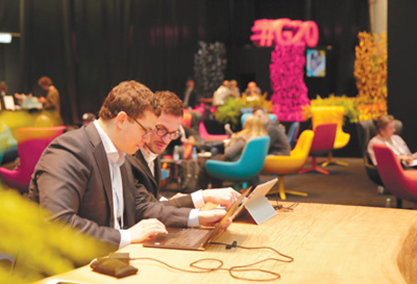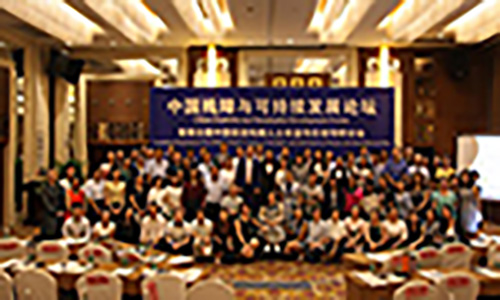


Reporters work at the media center of the G20 Hamburg summit. (Photo by Zhao Cheng from People’s Daily)
The two-day G20 Summit kicked off in Hamburg, Germany on Friday. As two members of the G20 Troika (China, Germany and Turkey), China and Germany have been working together to play a transiting role between the past and the future, said Chinese Ambassador to Germany Shi Mingde.
The Hamburg summit inherits the past by following the topics and outcomes of the Hangzhou meeting, the ambassador explained, adding that it inspires the future by reaching more consensus and yielding new outcomes based on close China-Germany collaboration as well as coordination among all parties amid the latest international situation.
During the G20 Hangzhou Summit, Chinese President Xi Jinping came up with an initiative of building an “innovative, invigorated, interconnected and inclusive world economy”.
Having the word “interconnected” from Xi’s proposal included, the theme of the Hamburg summit, namely "Shaping an Interconnected World", is a good proof that the topics and outcomes of the two meetings are organically related.
Topics such as digital economy, structural reform, sustainable development, partnership with Africa and international anti-corruption cooperation will also be discussed at the Hamburg Summit.
The Hangzhou Summit scored fruits from the discussion on development, a main agenda it selected, while the Hamburg meeting would continue to expand consensus on the 2030 Agenda for Sustainable Development and help Africa and other developing countries eliminate poverty.
During China’s presidency, the G20 has shifted its focus from crisis response to a long-term governance that gives emphasis to growth and its quality, said Ricardo Meléndez-Ortiz, chief executive of the International Centre for Trade and Sustainable Development (ICTSD), adding that China also prioritized the consistent trade and investment policy in cooperation.
Germany, after taking the baton, has not only followed the results of the Hangzhou meeting, but also ensured the consistency and sustainable development of the G20 agenda, Meléndez pointed out.
Amidst the increasing uncertainties faced by the world economy, major countries should send a clear signal to maintain an open world economy and jointly promote stable, inclusive and sustainable development, said Klaus-Dieter Böhm, chairman of a TV and media association in Germany.
That signal shares common grounds with the China-proposed Belt and Road Initiative, Böhm said. The Belt and Road Initiative, the world’s largest plan for infrastructure construction, will certainly propel the economic development of participating countries, he added.
The global economy is faced with two challenges: opening-up and growth, but the purpose of economic growth varies from country to country.
Developing countries regard economic growth as a way to eliminate poverty while developed economies need growth to scale up their middle classes. For either goal, economic growth is the fundamental approach, and opening-up is a prerequisite for economic growth.
China’s economic performance over the past 30-plus years is admirable and the country has lifted hundreds of millions of people out of poverty, hailed Wolfgang Schmidt, state councilor at the Hamburg senate chancellery.
The Belt and Road Initiative demonstrates a proper way to handle the relationship of opening-up and economic growth, he said.
 Magnificent view of Nansha Islands in South China Sea
Magnificent view of Nansha Islands in South China Sea Aerial view shows scenery in Hong Kong
Aerial view shows scenery in Hong Kong China builds world’s first offshore fish farm
China builds world’s first offshore fish farm A Foreigner's Chinese Dream and Love for China
A Foreigner's Chinese Dream and Love for China 5,000-year-old Chinese beer recipe goes down a storm in US
5,000-year-old Chinese beer recipe goes down a storm in US World's first driverless rail transit system unveiled in Hunan
World's first driverless rail transit system unveiled in Hunan World's largest cluster of Miao villages in Guizhou
World's largest cluster of Miao villages in Guizhou Daily life in Kashgar, China's Xinjiang
Daily life in Kashgar, China's Xinjiang Top 10 Chinese tech and engineering marvels
Top 10 Chinese tech and engineering marvels Top 10 most sustainable cities in China
Top 10 most sustainable cities in China Top 10 European patent applicants in 2016
Top 10 European patent applicants in 2016 The power of 'She' in China
The power of 'She' in China Seven most beautiful art museums in China
Seven most beautiful art museums in China China-NK Q1 trade data must be read fairly
China-NK Q1 trade data must be read fairly Children with disabilities still struggle to access mainstream schools: experts
Children with disabilities still struggle to access mainstream schools: experts Gay fiction bears brunt of new regulations that espouse socialist values
Gay fiction bears brunt of new regulations that espouse socialist values Mobile gaming industry booming
Mobile gaming industry boomingDay|Week